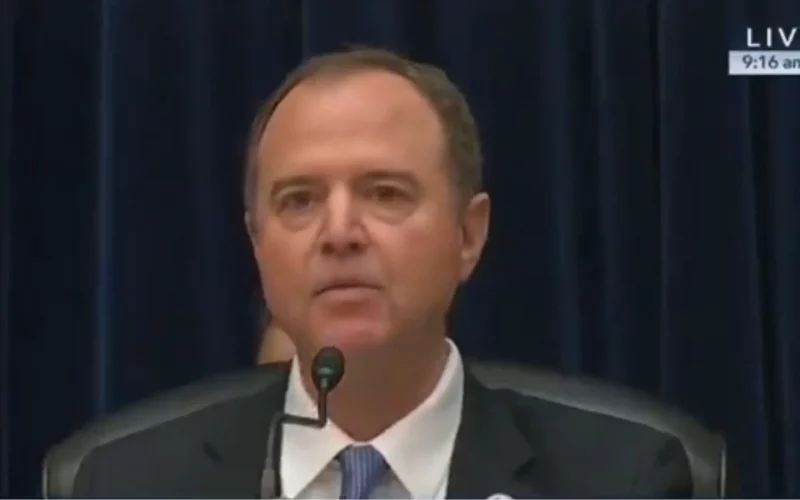Adam Schiff, a Democratic Congressman who was censured by the House of Representatives over his unfounded accusations of “Russia collusion” and who presided over the impeachment hearings of a former president based on hearsay, has a new idea for subverting the American republic: Banning the Electoral College.
The California Senate candidate has called for a fundamental revamp of American institutions, including the abolition of the Electoral College, the expansion of the Supreme Court, and the abolition of the filibuster, according to documents obtained by Politico.
The broad policy package — essentially a communist “wish list” for destroying the last vestiges of the constitutional republic — reinforces Schiff’s central pitch in his Senate campaign as a “defender of democracy.”
Schiff’s plan draws on his high-profile roles in the first impeachment of then-President Donald Trump and the congressional investigation into the Jan. 6 Capitol Riots.
The Ukraine Call Transcript was so damning that Adam Schiff had to completely rewrite it and make up quotes that weren’t in it.pic.twitter.com/bkB6RxLFjV
— Benny Johnson (@bennyjohnson) September 26, 2019
Though many of the individual agenda items are not new to Schiff, they give the most comprehensive articulation of his strategy for bolstering America’s so-called “democracy.”
“I think our democracy is at more grave risk now than ever,” Schiff said in an interview. “And it’s clear that that issue is going to be front and center — and needs to be front and center — on the national stage.”
America’s Founders largely despised pure “democracy,” in part because it is a highly unstable form of governance that inevitably leads to a tyranny of the majority.
Author Randall Holcombe summarized the Founders’ objections to direct democracy in Liberty in Peril: Democracy and Power in American History.
The role of government as [America’s founders] saw it, was to protect the rights of individuals, and the biggest threat to individual liberty was the government itself. So they designed a government with constitutionally limited powers, constrained to carry out only those activities specifically allowed by the Constitution.
Bernard Dobski, PhD., in a piece at the Heritage Foundation, specifically called out the American left’s recent calls to remove the Electoral College and the implications for the nation’s constitutional system of governance.
Indeed, the calls to abolish or circumvent the Electoral College in the selection of our chief executive represent the most visible sign of this democratic antipathy to our republican institutions. Senator Brian Schatz (D–HI), who introduced a bill to abolish the Electoral College, described it as “undemocratic and radical,” and called eliminating it “an unassailably logical evolution of our Constitution.”
Such a view seems to be a prerequisite for leading Democrats. Many of those Democrats who recently sought their party’s presidential nomination made the abolition of the Electoral College, in the name of greater equality, a formal part of their platforms. Explaining his opposition to the Electoral College, Senator Bernie Sanders (D–VT) said “[i]t is hard to defend a system in which we have a president who lost the popular vote by three million votes.”
The movement to circumvent the Electoral College enjoys increased momentum with the spread of the National Popular Vote Interstate Compact (NPVIC) that seeks to “equalize [individuals’] votes among states across the country.” According to John Koza, the chairman of the NPVIC, under its plan “[e]very vote of every voter in every state would count directly towards the presidential candidate that voter wants see to be president, so it would make every voter in every state equal.”
Similar hostility to the pillars of our republic in the name of more democracy is found across our political landscape: in the way many states rely on ballot initiatives to effect public policy; in the hostility to procedural limits that inhibit Congressional majorities from having their way; and in the increased dissatisfaction with the efficiency and responsiveness of our deliberative political institutions.
As a result, there is an increased interest in non-republican “solutions” to any obstacles to more democracy, whether it be endorsing Congressional term-limits, scrapping the Senatorial filibuster, expanding the number of justices on the U.S. Supreme Court, or developing more effective and immediate ways to express the will of the majority, such as quadratic, ranked-choice, and digital voting—anything to liberate more fully the direct will of the people.
America’s Founders carefully thought through the problems of direct democracy and explicitly rejected this model—and for good reason. They saw that because ancient democracies lacked any social or institutional forces that could check, refine, or moderate the will of the majority, they were prone to great instability, riven by factionalism, and subject to the passions and short-sightedness of the public. Direct democracies were thus vulnerable to tyranny.
Democracies’ tendency to transform into tyrannies doesn’t appear to be a “bug” to the modern Democratic Party, but rather, a “feature.”


Ban democriminals, and make communism wholey illegal!!! Amen